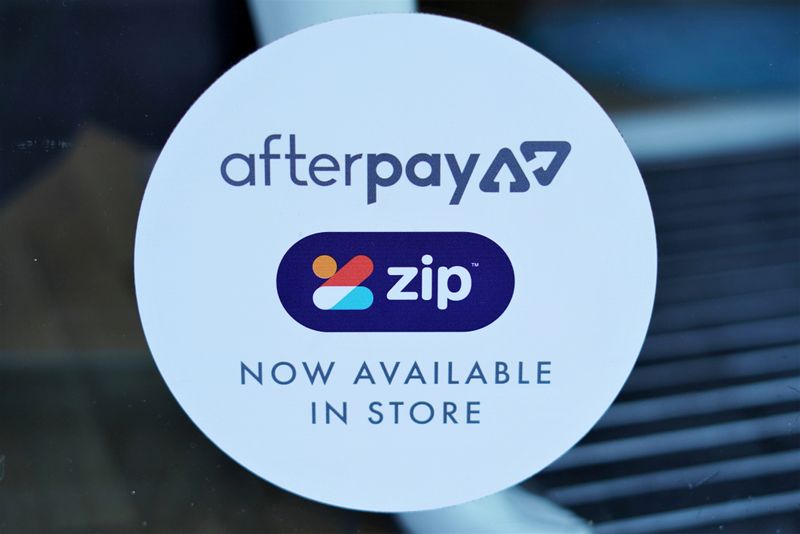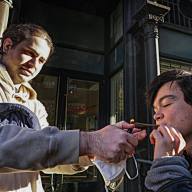SYDNEY (Reuters) – Identity theft complaints in Australia involving buy-now-pay-later finance doubled to a record last year, data seen by Reuters showed, raising calls for authorities to rein in the booming market.
Australia is a global pioneer in buy-now-pay-later (BNPL) retail financing and home to several top providers, including Afterpay Ltd, which have enjoyed hot growth in transactions, elevated valuations and loose regulation.
A sharp spike in fraud complaints, however, has raised questions about the soft oversight, which some analysts see as a key sector risk amid increasing advocate calls for greater consumer protections in the $4.3 billion market.
IDCare, a not-for-profit consumer support organisation, experienced a record 1,600 incident reports related to BNPL products in Australia last year, double the year before, data it prepared for Reuters showed.
While credit card fraud complaints were four times that amount, the pace of increase in BNPL fraud represents an outsize showing for the startup financing alternative.
“What it really shows you is how quickly the criminals adapt to the market for fraud and abuse the system,” said Moises Sanabria, acting managing director of IDCare.
IDCare is funded by various public and private sector institutions and acts as the main support service for identity theft victims in Australia.
UNFETTERED
BNPL firms lend shoppers instant funds, typically up to a few thousand dollars, which can be paid off in interest free installments.
As they generally make money off merchant commissions and late fees, not interest payments, they sidestep the legal definition of credit – and credit laws.
That means BNPL providers are not required to run background checks on new accounts, unlike credit card companies, and normally request just an applicant’s name, address and birth date, making it an easy fraud target.
The BNPL provider named in the most complaints in the past three years was Zip Co Ltd, mentioned in 32.9% of client engagements, the IDCare data showed.
Afterpay Ltd, Australia’s 12th-largest company after a 16-fold share price surge in a year, ranked third out of 17 and was named in 15.9% of BNPL complaints.
The data did not include details such as how many complaints resulted in the police or regulators being called. It also did not include complaints made to agencies other than IDCare.
Partly fuelling stellar growth in BNPL in 2020 were pandemic-related stimulus payments and tougher credit checks by traditional lenders.
But complaints grew in tandem, peaking in the three months to June 2020, right after Australia unleashed billions of dollars of pandemic relief payments, according to IDCare.
A Zip spokesman said the company had carried out “ID and credit checks on every applicant since day one” to stop identity theft.
He said “complaints to IDCare have grown because Zip has grown,” adding its Australian customers had expanded five-fold to 2.5 million in 2020.
An Afterpay representative said the company takes ID theft very seriously and uses tools such as second-factor authentication and account limitations when unusual activity is detected.
But Sharon Vermeer, a medical secretary from Perth, told how a family acquaintance opened an Afterpay account in her name in 2019 then used it to bankroll a A$2,100 ($1,618) shopping spree which she only discovered when a collection agency notified her of a missed payment.
“It’s so easy to open an account in someone else’s name… Unless you default, you’ll never know,” she said, adding she needed to file police charges against the acquaintance to clear the default from her credit history.
Afterpay did not respond to a query on Vermeer’s case.
REGULATION RISK
Australia’s BNPL boom has sparked a rush of listings and pushed stock valuations to high earnings multiples.
Overhanging that growth, however, is the spectre of tighter regulation.
While policymakers have so far held back on tighter regulation, rising concerns about bad credit and now fraud could bolster arguments for firmer protections.
Last week, the British government said it would force BNPL providers to run credit checks to reduce unserviceable debt.
“Applying credit laws to BNPL, like the UK has recently done, would require these businesses to ensure their processes effectively prevented against fraud,” said Gerard Brody, CEO of Australia’s Consumer Action Law Centre.
The Australian Securities and Investments Commission (ASIC) declined to comment on the IDCare data.
Andrew Bragg, a senator chairing a parliamentary inquiry on financial technology, told Reuters policymakers needed to balance consumer protection against the need for innovation.
“We want to see more choice, more competition, and buy-now-pay-later has been a good innovation and we’ve given ASIC significant regulatory tools to protect consumers,” said Bragg, who is due to deliver the inquiry’s final report in April.
($1 = 1.2980 Australian dollars)
(Reporting by Byron Kaye; Editing by Miyoung Kim and Sam Holmes)













